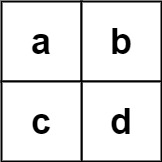leetcode212 word-search-ii
Leetcode 212. 单词搜索II
Author: Carissa ⛽️
Date: Dec.28 2023 😈
1 题目
给定一个 m x n 二维字符网格 board 和一个单词(字符串)列表 words, 返回所有二维网格上的单词 。
单词必须按照字母顺序,通过 相邻的单元格 内的字母构成,其中“相邻”单元格是那些水平相邻或垂直相邻的单元格。同一个单元格内的字母在一个单词中不允许被重复使用。
提示:
m == board.lengthn == board[i].length1 <= m, n <= 12board[i][j]是一个小写英文字母1 <= words.length <= 3 * 10^41 <= words[i].length <= 10words[i]由小写英文字母组成words中的所有字符串互不相同
示例 1:

输入: board = [[“o”,”a”,”a”,”n”],[“e”,”t”,”a”,”e”],[“i”,”h”,”k”,”r”],[“i”,”f”,”l”,”v”]], words = [“oath”,”pea”,”eat”,”rain”]
输出: [“eat”,”oath”]
示例2:

输入: board = [[“a”,”b”],[“c”,”d”]], words = [“abcb”]
输出: []
2 思路
2.1 暴力解法
2.1.1 最暴力的解法
在做本题时我首先使用了遍历 words 中所有单词,对每个单词 word, 从 board 的 [0,0] 处开始,如有匹配则做 dfs。这种解法,理所当然地,超时了。
时间复杂度是:$O(m\times n \times 4^l)\times O(\sum_{i=0}^{words.length}wrods[i].length)$
空间复杂度是:$O(1)$
m == board.length,n == board[i].length,l是所有单词的平均长度
2.1.2 暴力但是情有可原的解法
转换思路,还有一种暴力解法,先将所有 word 放入哈希表中,遍历 board 中的每一个字符,以每一个字符作为起始点dfs搜索,看是否有以该字符为开头的单词在哈希表中。为什么这个方法可行呢?因为题目中明确规定了 1 <= words[i].length <= 10, 即单词长度不超过 10。
这就意味着,dfs 的退出条件是找到单词,或者搜索深度大于10。
这种思路里,用 StringBuffer 或 StringBuilder 的长度记录搜索深度,当然本题用 ==StringBuffer 会超时😊==。
时间复杂度:$O(m\times n \times 4^{10})$
空间复杂度:$O(\sum_{i=0}^{words.length}wrods[i].length)$
2.2 Trie + 搜索
再对 2.1.2 做优化,结合单词,可以想到的就是 Trie 前缀树
这次做前缀树发现一个小技巧 👀:
💡 可以不用 boolean isEnd 作为结尾标记,而是采用 String value 只在单词结尾存入整个单词的方法做标记。这样在搜索过程中也不需要 StringBuilder 来额外记录当前搜索字符了。
3 复杂度分析
时间复杂度:
$O(m\times n \times 4^{10})$
空间复杂度:
$O(\sum_{i=0}^{words.length}wrods[i].length \times C)$
$C:$字符集大小,固定为26
4 完整解法
1 | class Solution{ |


